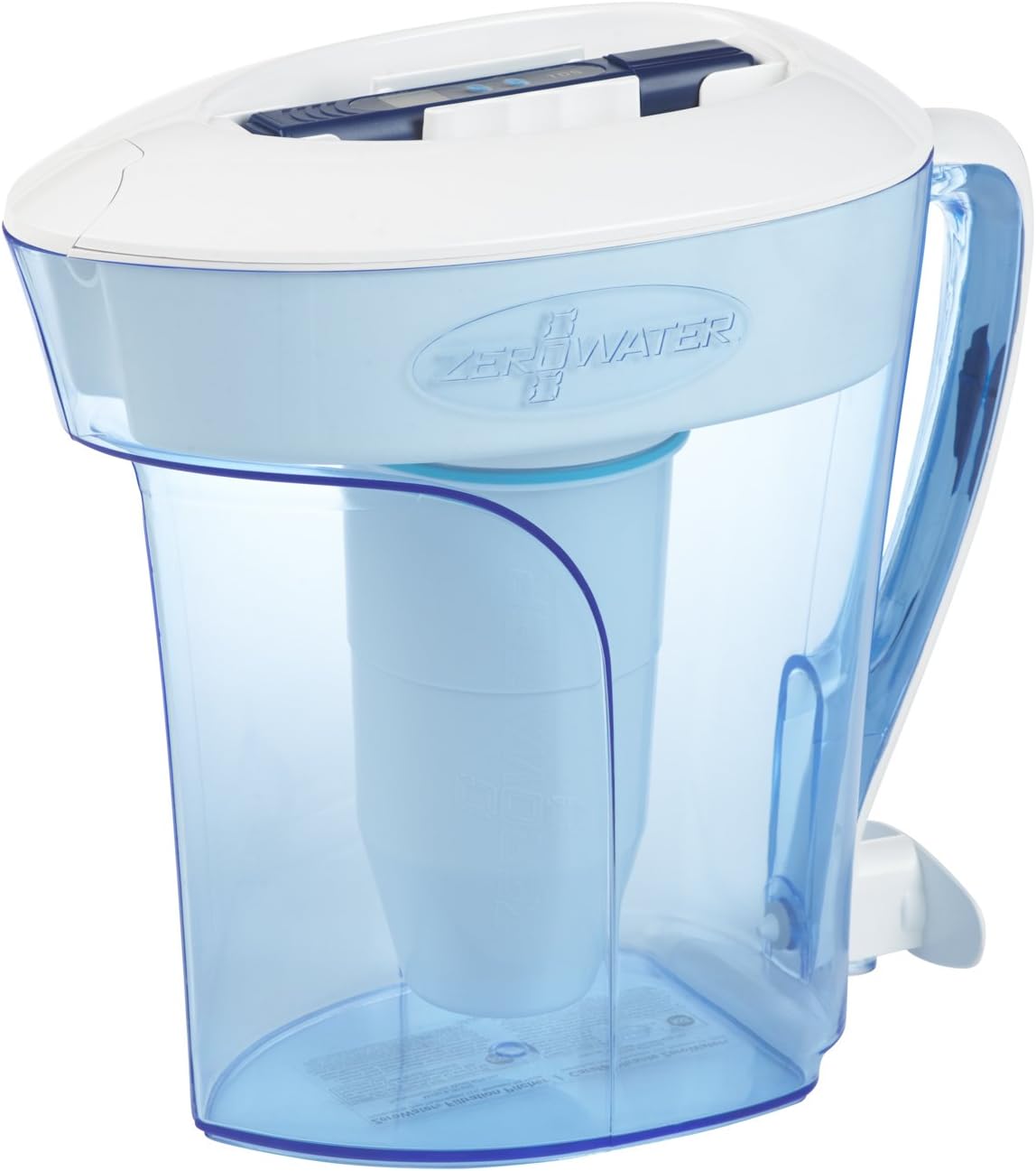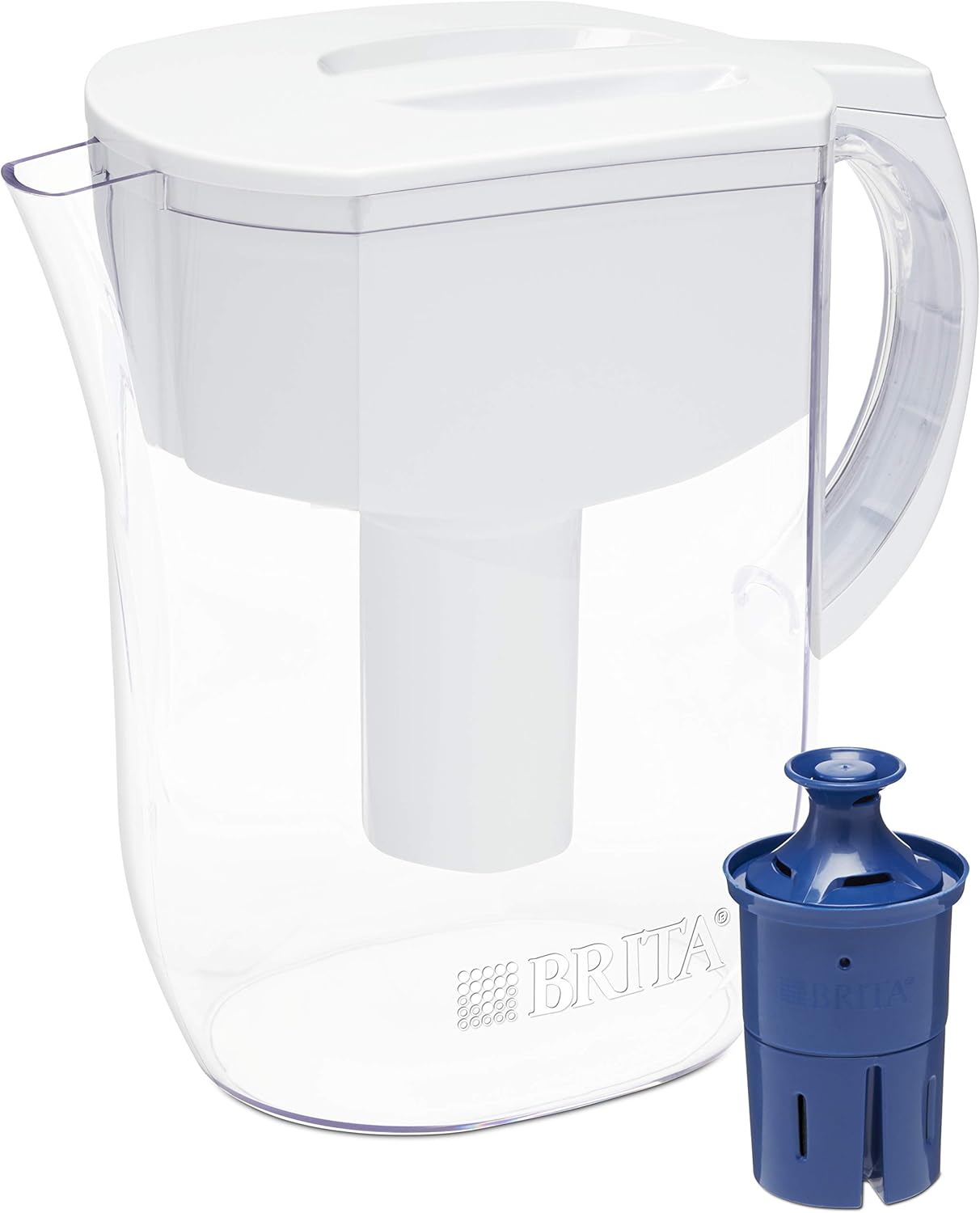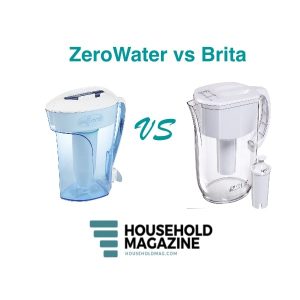Who Is ZeroWater and Brita?
ZeroWater is a leading brand in water filter pitchers. The company manufactures a variety of water pitchers with different capacities, from 6 to 40 cups.
They can filter out 99.6% of solid contaminants in water, like dirt, grime, and other harmful chemicals.
Brita, on the other hand, is a popular brand known for its high-quality pitchers, water bottles, and other filter systems for households. The company’s water filter pitchers improve the taste of the water.
Although they are both excellent water filter pitcher, they have differences. That’s what we’re going to find out in the next section.
ZeroWater vs Brita Comparison
To give you a better glance at how they differ from each other, please refer to the comparison table below.
| Image | PRODUCT/ Features | Rating | |
|---|---|---|---|
Winner |
ZeroWaterFilter Quality: Remove 99.6% of total dissolved solids (TDS), organic contaminants and fluoride Lifespan: Between 3 and 5 months Annual Replacement Cost: $90 Capacity: 10-cups or 2.3 liters Warranty: 90 days Special Features: 5-step filtration |
|
|
 |
Brita EverydayFilter Quality: Reduce 99% lead, chlorine, cadmium, mercury, asbestos, and benzene Lifespan: Approximately 6 months Annual Replacement Cost: $42 Capacity: 10-cups or 2.3 liters Warranty: 30 days Special Features: With electronic indicator |
|
Filter Quality
Both brands are NSF International certified. It means that these water pitchers effectively filter out specific harmful chemicals from the municipal tap water.
The basic filters from Brita have activated carbon that can easily grab organic particles and filter out chlorine. The company also offers upgraded filters that can remove lead, pharmaceuticals, and other contaminants that basic filters can’t remove.
But the filtration system of ZeroWater is significantly more efficient because the filter contains ion-exchange resin that can effectively remove salts, metals, and minerals on top of organic compounds.
It uses an advanced 5-stage filtration system. The first layer has coarse filtration components that eliminate fine particles and sediment.
When the water enters the second stage, the pitcher’s foam distributor allows even water dispersion across the width. As it passes through the activated carbon filter, other contaminants, like chlorine are filtered out.
After the third stage, the water undergoes demineralization before it goes through the last stage. That is the removal of ultra-fine particles from the water.
If you don’t believe these claims from ZeroWater, you may test the filtered water from the pitcher using a conductivity tester.
For the overall performance, ZeroWater removes 99.6% of total dissolved solids while Brita doesn’t reduce TDS substantially. ZeroWater is confident enough to include a TDS meter in its products to test if the filter is working.
When it comes to the taste test, though, it’s difficult to conclude. However, Brita is ideal if you want to drink water that tastes like spring water. But if you like mineral-free taste water, then ZeroWater is an ideal pitcher.
Design and Models
ZeroWater and Brita offer ergonomic designs for their water filter pitchers. It means that all models are easy to hold and you can pour the water easily.
They can fill half of the container from one fill of the reservoir.
Their locking systems are also ergonomically designed. There are no faulty seals with these pitchers, so you won’t have a problem facing the issue of accidentally drinking unfiltered water.
However, the larger Brita pitcher is difficult to hold and pour.
ZeroWater, on the other hand, offers a more ergonomic experience. Case in point, its 10-cup pitcher has a spout found at the bottom of the product.
With that design, you can pour filtered water into your glass without the need to lift a heavy pitcher every time.
Both pitchers let you quickly replace the filters and easily take them apart for cleaning.
For the overall design, though, ZeroWater is on the lead.
Flow Rate/Capacity
Both ZeroWater and Brita are “filter as you pour” pitchers. The former has a traditional reservoir with a barrier to prevent any unfiltered water from spilling over.
We examined how long these filters take to filter a cup of water. This factor is vital because not every person can wait more than one minute to get a cup of filtered water.
In our test, the Brita water filter could filter a cup of water within 40 seconds. ZeroWater, on the other hand, took more than a minute to give us a cup of clean water.
But ZeroWater filters aren’t the slowest in the market. PUR water filter took at least 3 minutes to fill a cup.
However, the speed may not be that pertinent for many of you. After all, the longer it takes to filter tap water, the better the water you can get.
The filtration speed will still depend on how contaminated the tap water is. Because of ZeroWater’s 5-stage filtration system, it’s logical to slow in filtering the contaminants.
Then again, waiting for 3 minutes to get a cup of filtered water may be overkill. And Brita also eliminates the need for the reservoir because you just need to fill the pitcher with water and it’ll be filtered as poured out.
Typically, water requires more time in contact with the filter to eliminate contaminants. But Brita does a great job because of its innovative design to filter out contaminants in 1 minute and 15 seconds.
Thus, in this case, the clear winner is Brita as you only need to wait less than 50 seconds to get a cup of filtered water. That’s six times faster than ZeroWater.
Certification
Both of these products received certifications from the Water Quality Association and National Science Federation. They are third parties that test water filtration devices independently.
Getting one or two approvals means that the filtering technology is effective. It also indicates that the product is safe to use at home.
These two groups certify different filters using their standards to ensure that the filters are doing their jobs in removing specific contaminants.
Brita is certified to reduce mercury, lead, and cadmium. But ZeroWater is the only pour-through filter to receive NSF certification to remove lead and chromium.
In that case, we pick both products in this category.
Filter Lifespan and Yearly Maintenance Cost
These filters will be less effective over time because the contaminants can build up. If you don’t change the filters when needed, bacteria or mold can grow inside the filters.
Manufacturers of these pitchers recommend replacing filters after the pitcher has filtered 40 gallons of water.
Brita’s standard filters can last more than 40 gallons. If you want a longer lifespan, though, you may wish to obtain a Longlast filter as it can give you 120 gallons of filtered water.
Approximately, the filters can last 6 months.
The filter cost is more complicated with ZeroWater. For the ZeroWater filter pitcher, however, you can only get an average of 15 gallons.
However, if you use these products in filtering out dirty water, the filters’ lifespan can go down significantly. For instance, if you’re using Brita, instead of 40 gallons, you may only get up to 30 or between 3 to 5 months.
You can spend approximately $90 for the filters per year when you choose ZeroWater while $42 annually for Brita.
Although both products are affordable, Brita is cheaper. But Brita filters are more affordable than ZeroWater filters because of the five-stage filtration method.
Furthermore, ZeroWater doesn’t do a good job at reducing odors and smells the same way as the Brita. With that in mind, the winner in this category is Brita considering the cost of replacing the ZeroWater filters.
Warranty
ZeroWater has a longer warranty. If the filter is defective, you can return the product within 90 days and get a replacement.
Brita, however, offers a shorter warranty period of 30 days. It’s probably the reason it’s cheaper than ZeroWater.
Stand Out Features
Both products can filter out contaminants. But some features truly make each stand out from the other product.
- TDS meter: ZeroWater has a built-in TDS meter so you can determine whether or not the filtered water still contains contaminants. Brita doesn’t have any.
- 5-stage water filtration process: It’s only available in ZeroWater. That’s why it can effectively eliminate contaminants.
- Filter Change Indicator: Brita makes it easier as it reminds you that it’s time to replace the filter using its filter change indicator. Each time you open the lid for 5 seconds, the indicator is activated while it measures water use as it counts the number of times it’s filled.
Which Water Filter Pitcher is Better? ZeroWater Vs Brita
These two water pitchers all offer pros and they’re certified to eliminate harmful materials from the water, including lead. They can also improve the taste of the water.
But one pitcher is ideal for a particular group of people.
+ You don’t want to lift a heavy pitcher when you wish to pour filtered water into your glass.
+ You want a compact pitcher that won’t take a lot of room in your refrigerator.
+ You like mineral-free taste water.
+ You want credit when you ship back the used filter to get a new filter.
+ You like a filter that effectively eliminates hard-water minerals.
+ You want a fast filter that can filter out contaminants in less than a minute.
+ You hate to pay more than $50 for a filter every year.
+ You want a filter that will remind you if the filter needs replacement.
+ You like to use a simple product without ergonomic elements.
+ You are used to drinking spring or tap water.

